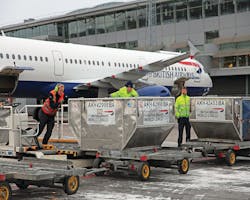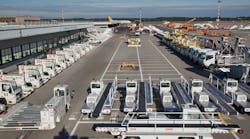“My name is Mark Fields, and I am a vocational high school teacher working at Edströmska MFT in Västerås, Sweden. I work primarily with airport ground handling students, and am trying to reach out to ground handling companies around the globe in hope of finding work placements for these students. I would greatly appreciate any help you can give us so we can provide the highest quality of education for our students. The following is a short description of our school.”
And so began our correspondence with Mark, which began about a week before we left for Germany to attend the inter airport last October and has continued in a series of emails ever since.
“I’m reaching out to all ground handling companies around the world,” he added in his first email. “Please can you help our students and Edströmska Transport School by sponsoring the students and their apprenticeship training. I would greatly appreciate any help you can give us to provide the highest quality of education for our students.”
Currently, Mark is training eight students in the school’s three-year “Airport Personnel” program.
“Students are given the required skills for working as ramp and refueling personnel, areas that are vital to a ground handling company’s success,” Mark later wrote us. “Given the Scandinavian climate, students also learn winter airport operating procedures, such as de-icing/anti-icing.”
While Fields is always looking for more help, particularly with finding jobs for the graduates, the program already relies on ramp training from ground handling service providers, such as Nordic Aero and Menzies Aviation, as well as Swedavia, a state-owned group that owns, operates and develops 10 airports.
CURRICULUM
The curriculum combines classroom training with hands-on training on the ramp at two airports.
“We use our local airport, Stockholm-Västerås airport, as an introduction to our second-year students,” Mark adds. “By the third and final year, we expect that our students are capable of handling larger assignment so they are sent to the two larger airports in the Stockholm regions – Bromma and Arlands airports.”
The airports are the obvious “classrooms” to teach students how to operated GSE.
“We give them the chance to use all sorts of GSE and teach about the circle of safety,” Fields added. “ ‘Safety, safety, safety,’ we repeat it all the time.”
Swedavia plays a big part in providing the training and test administration required for the security/safety badges and airside permits ramp agents need to operate equipment.
Generally speaking, the training breaks down into three parts:
- Airport Field Operations: Largely taught in a classroom, students learn the structure and function of different activities a the airport, along with the knowledge of various national and international regulations that govern operations.
- Ramp Operations: This portion of the training runs the gamut from the fundamentals of airside traffics regulations and many of the technical systems operating at an airport to airport security and using telecommunications equipment to keep in touch.
- Airport Operations Airside: More on the meat of the matter. Students learn everything from safe driving of GSE and handling of dangerous goods to flight planning and load volume and weight distribution and even firefighting and rescue operations.
“We provide a complete toolkit containing templates and documents, such as IATA, ICAO, AHM and DGR manuals,” Mark adds, “which allows our students to reach new heights in their professional training. Education should be used as a key to improve and better our lives in every aspect. Our hope is that through continuous development, we can train our students to become responsible ramp workers, making the transition from student to employee as smooth as possible.”
STRONG COMMITMENT
Mark, however, is more than a ramp trainer. While his position with the school is, in fact, full-time, he also works part-time at Arlanda Airport for Menzies Aviation as a ramp agent.
“Why? To keep myself updated on what’s happening airside and to make new contacts for the students,” Mark writes.
He added that Menzies managers help by giving him updated training material and are planning to visit “and give our school a chance to build a relationship … and see first-hand what we teach and how they can assist.”
Born in Dublin, Mark, 45, lived in the San Francisco Bay area for a time before going back to Ireland to work with FedEx. He is a Gulf War veteran and served with coalition forces during Operation Desert Storm in 1990-91. Mark eventually moved to Sweden in 1994 where he worked as a station agent for DHL at Vesteras Airport and joined the ground handling industry in 1994.
“Most of the students have stayed in the airport industry and are employed at different airport’s around Scandanavia,” he adds. “Feedback from all my former students is always on the long hours, but many are positive and continuing to study in order to advance inside those companies. As many inside the industry already know, this isn’t a 09:00-17:00 job.”
The last time we exchanged emails, Mark put in a request for donations of GSE.
“We don’t have anything at the school,” he explains. “Everything is at the airports.” He figures that having some donated equipment on hand at the school would help train students to operate equipment with an extra measure of safety.
“If student make a mistake, that’s OK,” Mark writes. “They can start over.” From the sound of one of our last email exhcanges, Mark had secured a deicing truck for the school.
To contact Mark, email him at [email protected].





